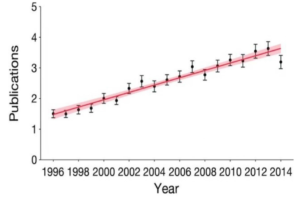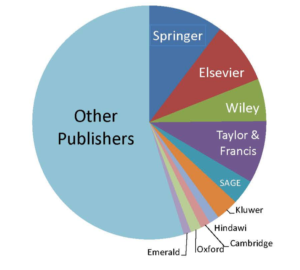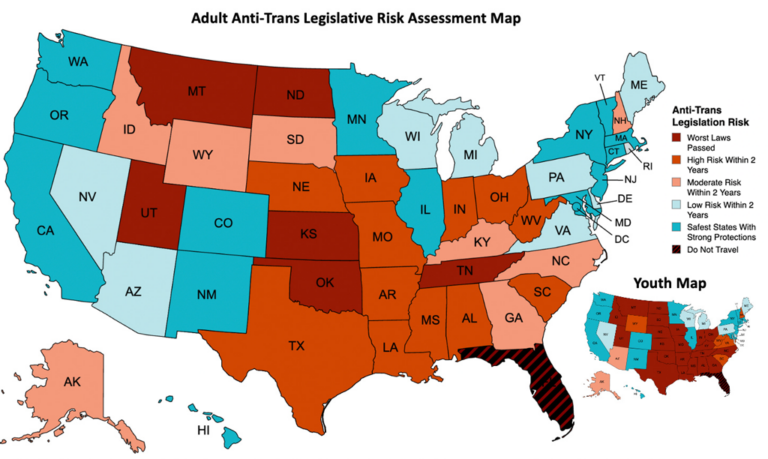The Publishing Paradox or How the Publishing Model May be Broken
 Among the familiar litany of New Year’s resolutions, many of you may have promised yourselves that 2020 would be the year to finally finish that book or write that article. In other words: to PUBLISH.
Among the familiar litany of New Year’s resolutions, many of you may have promised yourselves that 2020 would be the year to finally finish that book or write that article. In other words: to PUBLISH.
Publishing is a huge part of academic life, the coin of the realm. There may have been some mythical past when graduate students could obtain their PhD and land a decent academic job without having to publish a single thing. When tenure in research universities required just a few thoughtful articles or perhaps a book. And when those in predominantly teaching institutions could get by with producing something once or twice in a career.
Fast forward to our day. Rare is the PhD who lands a job without a CV listing several publications. And institutions of all stripes demand a quiver of accepted articles from their tenure=track hopefuls. It is not unusual to see professors within research universities generating several articles every single year, racking up Google Scholar hits and the citations to go with them. Some twitter posts look like “to-do” lists of publishing projects promised and completed. Working over weekends and holidays has become the norm.
This greater frenzy of publication is borne out by the magnificent growth in journal publications each year. The most recent figure showed some 2.5 million articles published in 28,000 journals. This is driven in part by an increase in articles per capita. The chart below shows the number of scientific publications for full professors at research universities in geography and area studies between 1996 and 2014. It shows that average article generation more than doubled, and this for a group with few worries about tenure and promotion.

All those would-be articles cycle through a publication system that has remained the same at its research core: authors who submit academic papers, other professors who kindly examine these submissions and provide comprehensive reviews, editors who orchestrate the whole process from beginning to end, and an audience of mostly academics ready to consume the scholarly output.
The truly dramatic changes have occurred in the larger publication universe. Two decades ago, there were many publishers such as Carfax, VH Winston, Pion, and Blackwell. In addition, there were still a number of independently published society journals. Many professors would take out personal subscriptions.
Today, most journal publishing has steadily consolidated into five or six big houses. The chart below shows the situation for all English-language journals. For just the social sciences, the top five publishers account for about 70 percent of all articles, compared to 15 percent in the early 1990s. These publishers sell journals to academic libraries as part of a package, but the costs of the packages can be stratospheric. Elsevier was recently embroiled in controversy because European libraries and the University of California felt that it charged far too much per article. Adding salt to these wounds is information that Elsevier makes about a 37 percent profit margin—selling back to academics content that these same academics have already produced. The other publishing houses employ the same basic model of selling to professors what the professors have already produced for free [full disclaimer, I am an editor for two journals published by Taylor & Francis].

Very little of the publishing profits—which can be staggering—dribbles down to the people who are the beating heart of the publication process. To be sure, publishing houses offer major benefits in production, allowing articles to be copy edited, proofread, typeset and put online in a matter of days. The ability of the average scholar to access thousands of titles—crisp and in full color—without ever having to leave her office is nothing short of phenomenal. Archives can be summoned with the click of a mouse. For those who can afford it, these companies expedite the smooth transmission of information. But by acting as consolidators and distributors, journal publishers position themselves to sell scientific knowledge provided to them for free.
Of these, the only person within the research circle who gets paid—maybe a few thousand dollars a year—is the editor, mainly to cover expenses. The authors sometimes have to pay to cover page charges, especially if they want their article to be freely available to the readership. (The promotion of open access, which journals have jumped all over, can be quite costly with fees in excess of $2000 per paper.) In all but rare occasions, the reviewers review for absolutely nothing (and in some disturbing situations will get junior colleagues and students to review in their name), and merit or promotion committees seldom bestow academic credit for this consuming labor.
Added to the morass has been the proliferation of so-called predatory journals. I am sure that every one of you has received a solicitation, perhaps several times a week, asking whether you want to publish in a journal with a fishy title (International Journal of Global Technology and Science Research anyone?). These journals come with all the trappings—submission guidelines and editorial boards—and they promise a lot: super-fast review (within days!) and sometimes offers to write the paper for you. Yet the fees are onerous and the articles themselves rarely get circulated. With so many legitimate journals out there encouraging open access fees, and the pressure to publish, it is little wonder that such journals are seen as viable options.
Of course, there are a host of ethical issues that involve societies like the American Association of Geographers. We have been able to negotiate some lucrative contracts with our publisher, Taylor & Francis, which pay many of our bills. But this also perpetuates the high prices academic institutions are charged for subscriptions, and can put scientific knowledge out of reach for people without access.
So given the fact that journal publishing is not only here to stay but proliferating, how do we make the process better? Some journals have chosen to avoid the big presses: Acme, Focus, and Fennia to name three. Especially if tenure committees can come unshackled from the need for metrics, such publications provide a place for solid and alternative scholarship.
We can also devise better ways to validate the process of peer review. As an editor, I badger experts in various topics to take several hours of their time to provide a critical service to an anonymous someone. There is no monetary compensation for this, nor does it make a mark on most CVs. Yet at least half say yes, and many of the others apologize and promise to review at a different time. The entire edifice of scholarly publishing would crash without peer reviewers, yet they are often as taken-for-granted as wall studs. It would be nice if there was also a way to reward peer reviewers in some fashion and perhaps the whole process might be revamped.
The paradox of publishing is threefold. We require graduate students and professors to publish in academic journals if they hope to advance. Yet authors and peer reviewers work for free and journal editors for very little, while article fees increase and publishing houses accrue the profits. Academic societies such as the AAG rely on contracts with journal publishers to secure some of these profits, essentially benefitting from the free labor of their members.
To abandon the system would mean altering the rewards intrinsic to academia and forgoing the revenues now vital to scholarly associations. But the University of California’s termination of their contract with Elsevier earlier this year demonstrates that this system may not be sustainable in the long term. We all have a stake in the outcome. I hope that geographers will lead the way in developing a fairer and more reasonable model for journal publishing.
— Dave Kaplan
AAG President
DOI: 10.14433/2017.0066


